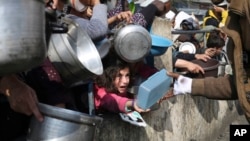Supplies of food to southern Gaza are at risk after Israel extended its military operations to Rafah, and those displaced by the offensive there face a public health crisis, a senior U.N. official said Friday.
While hunger and the risk of famine have been most acute in northern Gaza in recent months, the situation is now deteriorating in the south, said Carl Skau, deputy director of the U.N. World Food Program.
The main pipeline for aid earlier in the eight-month-old war was from Egypt into southern Gaza. But this was largely cut off in early May when Israel expanded its campaign in the city of Rafah, where much of Gaza's population was sheltering.
"We had stocked up before the operation in Rafah so that we had put food into the hands of people, but that's beginning to run out and we don't have the same access that we need, that we used to have," Skau said after a two-day trip to Gaza.
When Israel advanced in Rafah, many of those who had taken refuge there were displaced again northward and toward an evacuation zone in Al-Mawasi, an area on the coast.
"It's a displacement crisis that brings a protection catastrophe, really, that a million or so people who have been pushed out of Rafah are now really crammed into a small space along the beach," Skau said.
"It's hot. The sanitation situation is just terrible. We were driving through rivers of sewage. And it's a public health crisis in the making."
Military operations, delayed Israeli authorizations and increasing lawlessness within Gaza have all hampered aid distribution.
Skau said that although more food was reaching northern Gaza, basic health care, water and sanitation were needed to "turn the curve in the north on famine completely." Israel needed to let more health care goods into Gaza, he said.
Israel says it puts no limit on humanitarian supplies for civilians in Gaza and has blamed the United Nations for slow or inefficient deliveries.
And in news that could make the aid situation worse, the U.S. military is preparing to temporarily remove its humanitarian pier off the coast of Gaza because of anticipated sea conditions, a U.S. official said Friday. It is the latest challenge to the U.S. effort, which has been hampered by bad weather since the pier was put into place in May.
The floating U.S. military pier off Gaza had just resumed bringing humanitarian aid into the enclave after being suspended over the weekend.
The official, speaking on the condition of anonymity, said that the pier would likely be moved to the Israeli port of Ashdod until sea conditions improve.
Aid began arriving via the pier on May 17, and the U.N. said it transported 137 trucks of aid to warehouses, some 900 metric tons, before the U.S. announced on May 28 that it had suspended operations so repairs could be made.
The United Nations said on Friday it had still not resumed transportation of aid from the pier to U.N. World Food Program warehouses.
"Our security colleagues are still working to ensure that secure conditions for humanitarian work can be re-established," said deputy U.N. spokesperson Farhan Haq.
Since Hamas launched a terror attack October 7 on Israel, killing about 1,200 people and taking roughly 250 hostages, Israel has embarked on an offensive to eliminate Hamas from Gaza. In recent weeks, Israel says its forces have killed 30,000 people, the majority of them combatants. The Hamas-run Health Ministry in Gaza says 37,266 people have died, most of them women and children, but it does not estimate how many of the dead were combatants.





